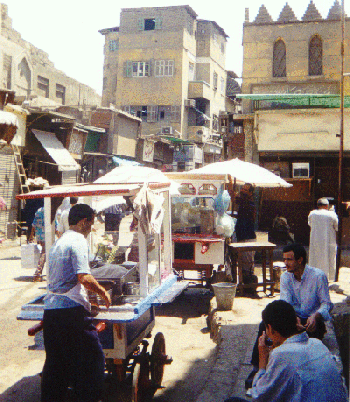

The modern world economy has created many new problems, as well as new opportunities, for the poor in both developing and developed nations. Free trade has provided new products, often at lower prices, but at the same time it has led to increased pressures to reduce costs--often at the cost of wages and environmental and worker safety. One result of this is the growth, over the last two decades, of the informal economy, sometimes called the "microbusiness sector". While there is substantial variation within this sector, much of it is made up of low-income familes who have opened up their own work opportunities to supplement or take the place of formal employment.

|
Often viewed as "traditional survivals", these activities often include street vending, small workshops, home garment workers, maids, among others, that are marked by the fact that, while they respond to modern economic conditions, they simply do not conform to modern legal requirements. Shops may operate without licenses, street vendors without permits, health and working conditions may be substandard, and taxes may be avoided. As a result, officials often see these activities as a set of "problems" to be ideally replaced by "modern" stores and factories, or at the most "tolerated" by turning a blind eye (often involving some form of corruption). |
It has been my contention, however, that these activities are more than just bothersome survival strategies--they offer hope and dignity for those engaged in them, while also providing valuable services for their communities. This is not to say that they are free from problems, both for participants, who are often subjected to abuse and exploitation, and for society. Working conditions, income fluctuations, problems with childcare, and public concerns such as public health, environmental protection, orderliness, and others are issues that need to be dealt with through realistic negotiation and give-and-take rather than top-down regulatory impositions. |

|

|
My contention is that many of the problems faced by these groups, as well as the problems they may cause, are rooted in inappropriate regulations that either prohibit them--meaning that they can only be conducted outside legal norms--or over regulate them. Complex, expensive and onerous licensing requirements, complicated tax systems, and irrelevant rules on practices are often imposed that simply make it impossible for families with few means to realistically follow them. |
While government officials fall over themselves to provide subsidies and tax breaks for large businesses, poor families struggling to provide services or goods for the market are simply left to fend for themselves--or see their activities subject to regulatory norms that fail to take into account their needs. As a result, the cummulative contribution that they make to the economy can be severely hampered. |

|

|
My research has shown that collective action on the part of those involved in these activities, enabling them to negotiate with officials, can have a positive impact on stablizing their income and markets, and can also allow improvements in their modes of operation. Greater benefits can be obtained, I believe, by forming community level organizations along sectoral lines that can be used as self-monitoring and self-development agencies. In practice, of course, each situation is unique and requires unique analysis and treatment. |
The role of an outside consultant, in any case, should be as limited as possible, but can be essential in establishing the credentials of those working in this sector, who are often as not seen as an unorganized rabble by officials and outsiders. It can also be essential in helping to mediate disputes between different groups, as well as better these groups and the authorities.
My approach in any case is to first sit down with each interest group involved to see the issue from their perspective. Ideally, if time permits, survey or participant research should be conducted to objectively determine the real dimentions of problems percieved by each group and to try to pinpoint adequate solutions that would meet the needs of each actor. Formal businesses may find that street vendors or workshops actually add to their business, rather than taking away from them, or that a mutually beneficial symbiotic relationship can be established. Officials may find that these same activities do or can create more benefits than headaches, if appropriately dealt with. In some cases it may involve writing new regulations, or providing support for people to meet the current system. In other cases, it may be to create special districts or zones.
I am available to work with development agencies setting up projects focusing on these and similar issues (microbusiness development, credit programs, etc.), community organizations concerned about issues in their area, government agencies and municipalities looking for new approaches, and organizations or groups that are involved in these activities and are looking for ways to resolve problems that they confront of either a political or economic nature.
If you are interested in finding out more about my approach to consulting, or you are interested in investigating the possibility of hiring me for this purpose, please fill out the following form. My fees are modest--typically about $300 a day plus expenses, but these can also be lowered for low-income groups. Furthermore, it is very likely that there are local foundations or sponsors in your area who would be more than willing to pay these costs. In any case, the first step is to send me an email. Please describe the issues that you are concerned with as much historical perspective that you can provide, and describe the potential solutions that have been attempted, or that you think would be appropriate. It might help to provide some idea of the level of commitment you expect to the project and the approximate budget that you are prepared to provide, if any. From there we can discuss these issues until arriving at a mutually agreed upon program and budget..
Either send me an email to this address: johncross@prodigy.net, or send mail to: